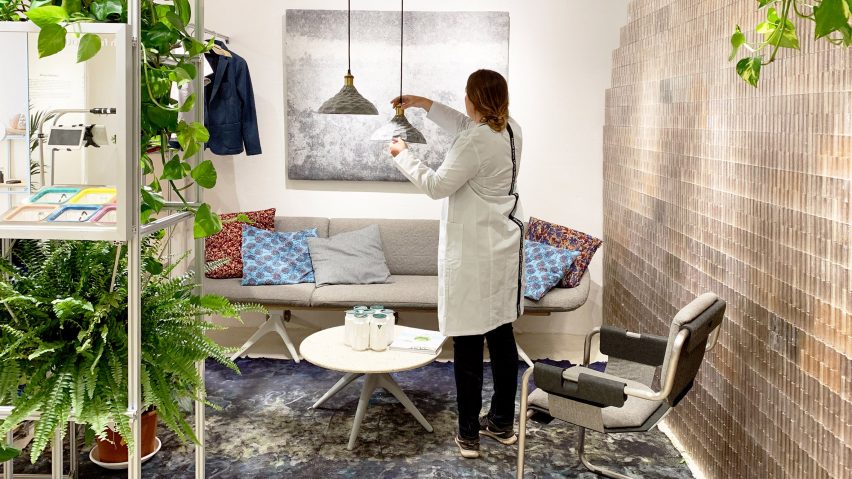Shoppers can only get recycled products from Miniwiz's Exchange pop-up store in Sardinia if they bring in plastic to be repurposed, as the shop doesn't accept money.
Located in Porto Cervo, Sardinia, the pop-up sells items made in-store from donated materials, including plastic water bottles, take-away coffee cups, and shopping bags.
Shoppers get credit for new products, including colourful tiles and lamp shades, by giving post-consumer waste to be ground down and repurposed.
The pop-up is the latest iteration of circular-economy engineering company Miniwiz's Trashlab. The mobile laboratory, which aims to demonstrate the possibilities of reusing waste, has previously appeared at London Design Festival, Milan design week and in Tibet.
The store is equipped with Miniwiz's Trashpresso machine, and a smart rubbish bin called Robin.
Robin tracks and sorts the waste into types, and transfers it into points that the consumer can save using the Robin app. These points are used to purchase as the pop-up doesn't accept any cash.
The Trashpresso portable recycling machines clean and dry the waste before shredding the separated recyclables into small flakes.
These are combined and heated in a heat induction press, with the particular temperature dependant on the constituent parts. The heated plastic is moulded and pressure applied to shape it.
The entire production process takes less than five minutes, from waste to new product.
The pop-up also includes a display of the types of waste that Miniwiz is transforming, arranged on a series of plywood shelves alongside the products for exchange.
A breakout area at the centre of the store is decorated with items of furniture made from things that have been thrown away.
"Every product you touch, every textile you feel is up-cycled from the single-use packaging waste you previously consumed," said Miniwiz.
"Every inch of this concept store is filled with stories of human ingenuity of using technology to stop the chemical and plastic pollution in our environment."
Tours of the pop-up are conducted by staff wearing coats made from waste materials.
Miniwiz founder Arthur Huang argued during Milan Design Week this year, that bioplastics could be as damaging to the environment as those made from fossil fuels, if not more so.
The most common form of bioplastic is polylactic acid (PLA). When bioplastic made from PLA decomposes, it lowers the pH level of the soil making it more acidic which may have an effect on the surrounding ecosystem.
Recycling bioplastic is a better solution than allowing it to decompose, however single-use plastics are the real issue.

